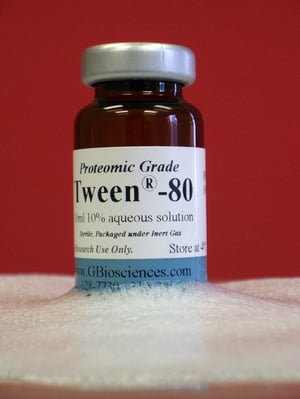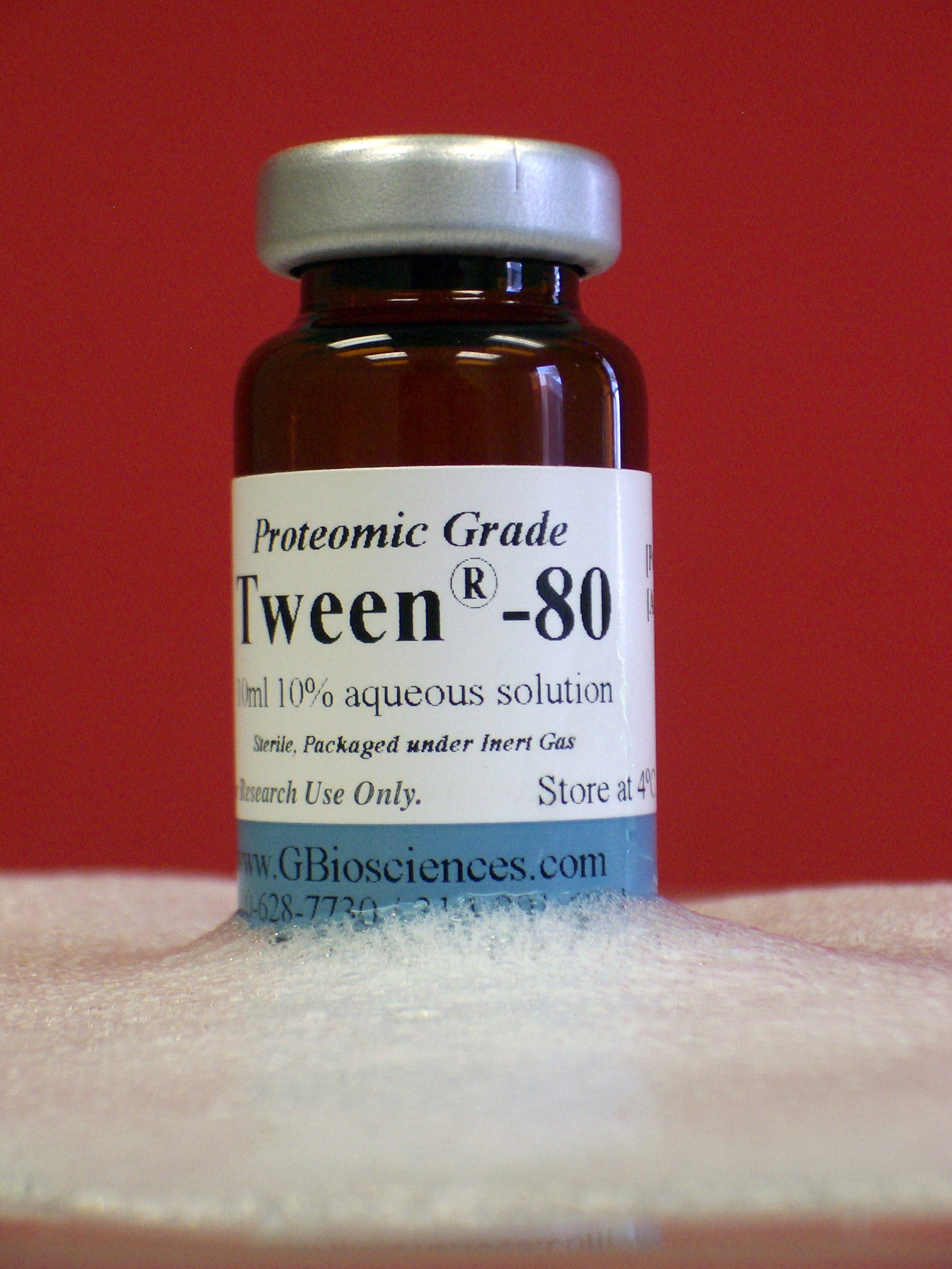 Various types of commercial-grade detergents contain elevated levels of sulfhydryl oxidizing agents, peroxides, salts, and carbonyl compounds. The proteins that are isolated by these detergents are highly susceptible to contaminating peroxides and carbonyls. The peroxides oxidize the proteins, and the carbonyl groups will form Schiff’s bases with the proteins that interfere with its structure.
Various types of commercial-grade detergents contain elevated levels of sulfhydryl oxidizing agents, peroxides, salts, and carbonyl compounds. The proteins that are isolated by these detergents are highly susceptible to contaminating peroxides and carbonyls. The peroxides oxidize the proteins, and the carbonyl groups will form Schiff’s bases with the proteins that interfere with its structure.
Tween 80 is a non-ionic detergent utilized for research purposes or as a 10% proteomic grade solution. It is ideal for biochemical applications, as well as protein solubilization and stabilization. G-Biosciences 10% Tween 80 proteomic grade solution is highly purified, removing the interfering sulfhydryl oxidizing agents, peroxides, salts, and carbonyl compounds.
What is Tween®?
Tweens are amphipathic, non-ionic surfactants composed of sorbitol fatty acid ester and ethylene oxide, and either soluble or dispersible in water.
They undergo autooxidation, cleavage at the ethylene oxide subunits, and hydrolysis of the fatty acid ester bond. Autooxidation results in hydroperoxide formation, side-chain cleavage, the formation of short-chain acids that influence the stability of biopharmaceutical products (Kerwin (2008)).
Tweens are typically used as a non-ionic detergent for selective protein extraction and isolation of nuclei from mammalian cells. They are also used as a surfactant for dispersing hydrophobic particles in aqueous solutions. Tweens are incompatible with alkalis, heavy metal salts, phenols, and tannic acid.
What is Tween® 80?
Also known as polysorbate 80 or polyoxyethylene sorbitan monooleate, Tween 80 is a polyethylene sorbitol ester. It has a molecular weight of 1.31 kDa and functions as both a stabilizer and an emulsifier.
It is a non-ionic detergent present as a biocompatible surfactant in food, biotechnical, and pharmaceutical products.
G-Biosciences Tween 80 solubilizes membrane proteins during the isolation of membrane-protein complexes, and in ultra-low concentrations of contaminating peroxides, aldehydes, salts, and carbonyl compounds.
It is an essential component of several biochemical applications, including:
- As a hydrophilic emulsifier in the preparation of W1/O/W2 emulsion
- Emulsifying and dispersing substances in medicinal and food products
- Selective protein extraction
- The growing of tubercle bacilli
- Isolating nuclei from mammalian cell lines
As an anti-bacterial agent, Tween 80 has little to no activity. However, it does harm the anti-bacterial effects of methylparaben and related compounds.
It is miscible in water (0.1ml/ml), as well as alcohol, dioxane, and ethyl acetate. It is practically insoluble in liquid paraffin and fixed oils.
What is the Role of Tween 80 in Protein Solubilization and Stabilization?
Tween 80 is essential to protein solubilization and stabilization and protects protein from agitation-induced aggregation. It prevents surface absorption and acts as a stabilizer against aggregation. It also solubilizes membrane proteins during the isolation of membrane-protein complexes.
The G-Biosciences Proteomic Grade Detergent Solutions contains reduced peroxides and carbonyl compounds. They also have less than 50µs conductivity.
G-Biosciences offers the non-ionic detergents as sterile, 10% aqueous solutions, which are sealed under inert gas and are suitable for protein applications.
Choose G-Biosciences for Your Proteomic Research Needs
G-Biosciences offers a variety of products for your life science research, including our Proteomic Grade Detergent Solutions. Visit our website to claim yours today!
Kerwin, B.A. (2008) J. Pharm Sci. 97:2924






